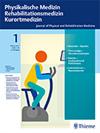站立屈肌试验:骶髂功能障碍的第一个指征——实践研究
IF 0.5
4区 医学
Q4 REHABILITATION
Physikalische Medizin Rehabilitationsmedizin Kurortmedizin
Pub Date : 2022-11-18
DOI:10.1055/a-1967-2509
引用次数: 0
摘要
背景站立屈曲试验(SFT)是一种定向试验,支持诊断手法医学中的骶髂关节功能障碍(SIJ-D)。然而,对这一术语的文献研究却显示出缺乏相应的调查。目的是研究SFT在可能的SIJ功能紊乱中的重要性。方法要求医学会徒手医学教师(物理治疗师和医生)填写一份文件表,考虑到属于常规徒手医学记忆结果的不同呼气程序。唯一的入选标准是SFT阳性。结果以相应的百分比进行说明。结果2019年1-8月,20名MM教师共完成了366份SFT阳性的SIJ数据表,其中6份不完整。在360名入选患者中,263名患者实际上患有SIJ-D(73.06%)。进一步的相关结果涉及SIJ区域的疼痛(360名患者中有205名;SIJ-D患者中有173名)、Patrick Kubis测试(360名中有246名;SIJ-D患者中的201名)、骨盆倾斜(360名,134名)、盆腔扭转(360名;164名)和髂肌张力增加(360名和216名)。讨论在SFT呈阳性后,Patrick Kubis试验、髂肌强直检查和SIJ区疼痛指示可用于诊断SIJ-D。如果这三个方面中至少有两个突出,那么SIJ-D很可能会出现。本文章由计算机程序翻译,如有差异,请以英文原文为准。
Standing Flexion Test: A Manual Diagnostic Test as First Indication
of Sacroiliac Dysfunction – Study from Practice
Background The standing flexion test (SFT) is an orienting test,
supporting to diagnose a sacroiliac joint dysfunction (SIJ-D) in manual
medicine. However, the literature research for this term shows the paucity of
according investigations. The aim is to investigate the importance of the SFT
with regard to possible functional disorder of the SIJ.
Method Teachers of the Medical Association for Manual Medicine
(physiotherapists and physicians) were asked to fill in a documentation sheet
considering different exsmination procedures belonging to routine manual
medicine anamnestic findings. The only inclusion criterion was the positive SFT.
The results are presented descriptive with according percentages.
Results From January to August 2019, a total of 366 SIJ data sheets with
positive SFTs were completed by 20 ÄMM-teachers, involving six
imcomplete ones. 263 of the 360 patients enrolled actually had a SIJ-D
(73.06%).Further relevant results refer to pain oft he SIJ region (205 of 360; 173 with
SIJ-D), the Patrick-Kubis-Test (246 of 360; 201 with SIJ-D), the pelvic tilt
(134 of 360; 134 with SIJ-D), the pelvic torsion (209 of 360; 164 with SIJ-D)
and the increased iliac muscle tone (282 of 360; 216 with SIJ-D).
Discussion After a positive SFT, the Patrick-Kubis-test, the tonus check
of the iliac muscle and the indication of pain in the SIJ-region can be used for
the diagnosis of a SIJ-D. If at least two of the three aspects are conspicuous,
SIJ-D is very likely to be present.
求助全文
通过发布文献求助,成功后即可免费获取论文全文。
去求助
来源期刊
CiteScore
1.10
自引率
25.00%
发文量
70
审稿时长
3 months
期刊介绍:
The Journal of Physical and Rehabilitation Medicine offers you the most up-to-date information about physical medicine in clinic and practice, as well as interdisciplinary information about rehabilitation medicine and spa medicine.
Publishing 6 issues a year, the journal includes selected original research articles and reviews as well as guidelines and summaries of the latest research findings. The journal also publishes society news and editorial material. “Online first” publication ensures rapid dissemination of knowledge.

 求助内容:
求助内容: 应助结果提醒方式:
应助结果提醒方式:


